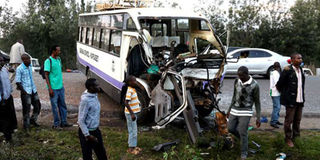To reduce road carnage, drivers should take responsibility for their actions

The scene of a road accident along the Nakuru-Eldoret Highway on August 17, 2016. PHOTO | SULEIMAN MBATIAH | NATION MEDIA GROUP
What you need to know:
By placing accident liability where it belongs, on individual human beings, drivers would be obliged to behave better because doing anything else would have personal consequences.
This way, we can hope to reduce the carnage on our roads.
Loss of lives due to accidents on Kenyan roads is a huge problem. We lose upwards of 3,000 people and thousands of others are injured on our roads every year. The cost to the economy is currently estimated at between 1 and 3 per cent of our annual gross national product. Yet we have a relatively low motorisation rate of approximately 45 vehicles per 1,000 people. At this rate, road accidents will become a terrifying disaster unless we do something about it urgently.
We have made huge investments in cars and a new transport infrastructure, established a dedicated road safety institution (the National Transport and Safety Authority – NTSA), and made numerous reviews of legal frameworks and sensitisation campaigns. We also recognise the use of information technology in the operations of road transport services, but we have not managed to reduce road accidents. What should we do? It is vital to first recognise a fundamental fact – that it is human beings who cause accidents, NOT vehicles, then act accordingly.
According to the NTSA, 85 per cent of road accidents happen due to human error, 11 per cent due to vehicle condition, while 4 per cent are as a result of road and environmental conditions. The simple and logical message from these statistics is that it is human beings who cause accidents. Even the 11 per caused by vehicle condition has its origins is human neglect and or irresponsible behaviour. Therefore, for maximum impact in reducing the number of road accidents, we have to focus on the human beings.
NO CONNECTION
Currently, there is no connection between possession of a driving licence and actual driving competence. We have lost that linkage to corruption. Many Kenyans who have a driving licence do not actually have any meaningful driving skills. We need to re-establish this link. A licence should mean that you have significant driving skills and there should be a way of profiling those who do not and get them to pay for it.
The law requires a mandatory minimum third-party insurance cover for every vehicle on the road. The car owner meets this cost. I propose that this burden and liability be shifted from the vehicle to the driver. When a human being puts a vehicle on the road, he or she logically carries the liability of what may happen.
We have traffic laws and regulations that stipulate drivers’ legal obligations, including prohibition of certain driving-related (mis)conduct in order to ensure the safety of other road users. Thus, when a driver violates these laws resulting in death, injury and or damage to property, they are deemed to have breached their duty of care to other road users and public or private property.
Therefore, the law should require every driver to transfer such liability from themselves to a legally registered insurance underwriter. It is the driver, NOT the vehicle, that should carry and produce the appropriate third-party insurance certificate when required by the police. Insuring vehicles should be entirely voluntary to protect the investment rather than third parties, who should be covered by the driver’s insurance.
The driver’s insurance card should be chip-enabled to carry information such as personal and insurance details, number and type of previous traffic offences, which should be accessible to authorised entities such as the police, insurance companies, and the NTSA.
Each driver should have a traffic offence profile to inform driving licensing and judicial traffic offence decisions and insurance renewal premiums. The data should disclose different risk profiles and categories in the driving population such as matatu and boda boda drivers. Those individuals and or categories that cause more death and destruction should pay higher premiums, higher fines, and ultimately, lose the privilege of driving.
By placing accident liability where it belongs, on individual human beings, drivers would be obliged to behave better because doing anything else would have personal consequences. This way, we can hope to reduce the carnage on our roads.
Kiriro wa Ngugi is a consultant in public affairs and policy. [email protected].





